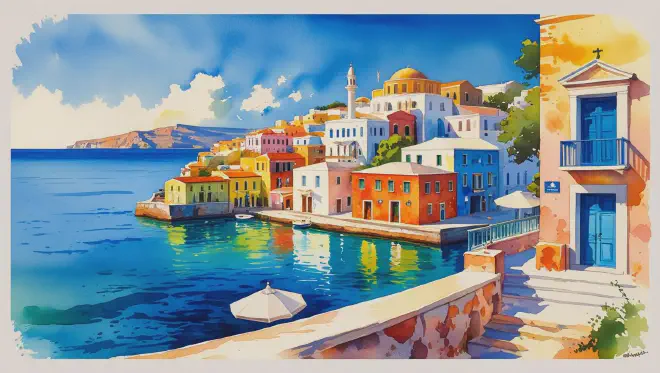Introduction: A Small Paradise Embraced by Silence and Azure
Halki Island, floating in the Aegean Sea, holds a special place among the Dodecanese islands as one of the smallest jewels. With an area of just 37 square kilometers and a population of fewer than 300 souls, this island seems to have been left behind by the waves of tourism, preserving the authentic spirit of old Greece in its purest form.
The island’s name “Halki” derives from the ancient Greek word for “copper.” Once, copper mining flourished here, and the mineral-rich soil still tints the island’s earth with a reddish hue. The coastline weaves intricate patterns, dotted with hidden coves that feel like secret refuges. Here spreads the crystalline blue sea—that deep, clear azure known as “Aegean Blue.”
The island’s heart, Emborio, is embraced by beautiful neoclassical buildings that circle the harbor like a protective embrace. These structures carry the lingering spirit of the late 19th and early 20th centuries, when the island prospered from sponge diving. White walls with blue window frames, and cobblestone alleys—the quintessential Greek landscape breathes here unchanged.
These three days and two nights on this small island would surely transform the very flow of time itself. With such expectations warming my heart, I set out on my journey to Halki Island.

Day 1: Arrival at a Harbor Where Time Stands Still
After two hours swaying aboard a small ferry from Rhodes, the harbor of Emborio revealed itself before me, and I found myself holding my breath. The beautiful scene that had only existed in postcards was spreading out as reality.
Just past 10 AM, standing on the ferry’s deck and feeling the sea breeze, I watched the island draw closer. The neoclassical buildings surrounding the harbor appeared as if time had stopped since 19th-century Europe. The contrast of orange roof tiles against white walls glowed beautifully in the morning sunlight. Most buildings stood two stories high, with tavernas, cafes, and small shops lining their ground floors.
Stepping onto the harbor, the sound of cobblestones echoed under my feet. As I walked, pulling my luggage, a local elderly man called out “Kalimera (good morning)” with a warm smile that immediately put me at ease. My accommodation, “Villa Halki,” was just a three-minute walk from the harbor—a small hotel housed in a renovated traditional stone building.
After settling my luggage in the room, I ventured out to explore the island. Emborio’s center was small enough to walk around completely, carrying an atmosphere of gentle nostalgia. I decided to have lunch at “To Limani” (meaning “the harbor”), a taverna near the port. The owner, Yanis, was a cheerful man in his mid-sixties who spoke fluent English and regaled me with stories of the island’s history.
“This island once thrived on sponge diving,” he explained. “Even now, the older fishermen still know those techniques.”
I ordered the island’s specialty: fresh grilled fish and horiatiki salad. The fish was snapper, caught that very morning, simply seasoned with olive oil, lemon, and oregano. With the first bite, the fish’s sweetness and the herbs’ fragrance filled my mouth completely. The salad’s tomatoes were incredibly sweet, with the feta cheese’s saltiness and olives’ deep flavor creating perfect harmony.
In the afternoon, I walked toward St. Nicholas Church on the island’s heights. The cobblestone path gradually became a slope, winding between white-walled houses. Everyone I met along the way greeted me warmly. The journey to the church was perfumed with wild thyme and rosemary.
St. Nicholas Church was a small white building housing Byzantine-style icons. The view of the harbor from the church steps was breathtakingly beautiful. White buildings floating on the blue sea, with Turkish mountains visible in the distance. I lost track of time, mesmerized by this scenery.
Evening brought the fishermen’s return to harbor. Watching small fishing boats enter the port one by one, I sipped traditional Greek coffee at a cafe. The rich, aromatic coffee came with small cookies called “klaviedes,” fragrant with cinnamon and cloves, seeping into my tired body like a warm embrace.
For dinner, I returned to “To Limani,” ordering moussaka and dolmades (rice stuffed in grape leaves). The moussaka’s layered flavors of eggplant, meat sauce, and béchamel sauce embodied the essence of home cooking. Each dolmade was carefully wrapped, the rice infused with mint and dill herbs, leaving a refreshing aftertaste.
After dinner, I walked the harbor’s cobblestones, savoring the night’s tranquility. The buildings, illuminated by street lamps, showed a different face than during the day, while moonlight painted a silver path across the water’s surface. From somewhere in the distance came the sound of a bouzouki, announcing the island’s evening’s beginning. Before returning to my room, I gazed once more across the harbor, where small fishing boats rested quietly at anchor—a scene like a painting come to life.
Day 2: A Day Touching the Island’s Bounty and Traditions
I awoke to birdsong in the morning. Opening the window, the Aegean Sea’s fresh breeze flowed into my room. Looking at the clock, it was just before 7 AM. Adapting to the island’s rhythm, I had naturally become an early riser.
Breakfast was served in the inn’s courtyard: freshly baked bread, local honey, fresh yogurt, and olives grown on the island. Simple yet each item’s natural flavors stood distinctly. Particularly impressive was the rich Greek yogurt drizzled with honey of remarkable aromatic complexity—made by bees collecting nectar from the island’s wild herbs.
In the morning, I headed to Pondamos Beach on the island’s opposite side. A 45-minute walk from the harbor, crossing mountain paths in a small adventure. Along the way, I enjoyed the island’s inland scenery: ancient olive trees scattered across hills where wild herbs flourished. Thyme and sage grew wild underfoot, releasing fragrance with each step.
Pondamos Beach was a hideaway beach nestled in a small cove. The sea’s transparency was so clear I could see straight to the bottom. With no one else on the beach, it was truly a private paradise. I read my book while occasionally entering the sea to swim. The seawater’s salt remained pleasantly on my skin while the sun’s warmth enveloped my entire body.
Lunch consisted of sandwiches and fruit I had brought. Though simple, eating in this beautiful environment made it feel like the finest feast. As the afternoon sun grew intense, I napped under a beach umbrella. In the silence filled only with wave sounds and bird calls, I fell into deep sleep.
On the evening return journey to the harbor, I met Maria, a local woman who was a traditional embroidery artisan running a small workshop from her home. When I showed interest, she graciously let me tour her workshop.
“This embroidery has been passed from mother to daughter through tradition,” she explained. “It takes several months to complete one piece.”
Maria’s handmade embroidery featured beautiful geometric patterns in blue and white—colors that perfectly expressed the Greek sea and sky. Feeling the love and time invested in this detailed handwork, I purchased a small tablecloth.
For dinner, I tried another harbor taverna, “I Paradisos” (Paradise), whose owner-chef Andreas was known for creative cuisine using island ingredients. The appetizer featured a salad of island-harvested seaweed with freskos (fresh cheese). The seaweed’s mineral-rich flavor combined with creamy cheese created a refreshing combination.
The main dish was the island’s specialty: lamb kleftiko. Lamb wrapped in paper with vegetables and slowly baked in the oven, the meat was so tender it could be cut with chopsticks, while vegetables’ sweetness and herbs’ aromas melded into unity. The accompanying lemon potatoes, baked with olive oil and lemon juice, achieved perfect texture—crispy outside, fluffy inside.
For dessert, I enjoyed handmade baklava. This confection of layered phyllo pastry filled with nuts and honey created harmony between crispy texture and rich sweetness, providing the perfect meal’s conclusion.
After dinner, I chatted briefly with Andreas. He had trained in Athens in his youth but chose to return to his native Halki to cook.
“City life wasn’t bad, but this island’s tranquility and beauty can’t be experienced elsewhere. I believe cooking with ingredients grown here is my calling.”
His words revealed deep love for the island. Walking the harbor at night, I contemplated the beauty of the islanders’ life-rooted philosophy.
Day 3: A Morning of Farewell and Memories That Remain in the Heart
On the final morning, I woke earlier than usual. Looking down at the still-dim harbor, I reflected on these three days and two nights. The view from my room window should have been the same as on arrival day, yet it seemed different somehow. Perhaps something within me had changed.
After breakfast, I set out for a final walk. Strolling the harbor’s cobblestones, I accumulated small discoveries: building decorations I hadn’t noticed before, a small square where cats basked in the sun, a workspace where fishermen repaired nets. Each moment of the island’s daily life felt especially precious today.
At a bakery near the harbor, I took my journey’s final coffee break. When the elderly owner, Efi, learned I was departing, she sent me off with homemade cookies.
“Come back again,” she said warmly. “Halki Island will always be waiting for you.”
Her kind words warmed my heart. Even after such a brief stay, the island’s people had welcomed me like family.
At 11 AM, the return ferry arrived at the harbor. While gathering my luggage and heading to the port, I happened to meet Maria, whom I’d encountered yesterday. She had come to see me off.
“Though your stay was short, I’m happy you came to love the island. Please carry Halki Island’s tranquility and beauty in your heart.”
Standing on the ferry’s deck, I watched the island gradually shrink away. Emborio’s beautiful buildings, the hill with St. Nicholas Church, and the warm smiles of the people who had welcomed me—everything was vividly etched in my heart.
As the ferry pulled away from Halki Island, a certainty grew within me. This island experience hadn’t been mere tourism. It had been a profound spiritual journey that changed time’s flow and provided an opportunity to reconsider life’s values.
The islanders’ life philosophy, harmony with nature, and above all, the importance of “living slowly”—something easily lost in modern society—this small island had taught me. The Aegean Sea’s blue waters and sky, cobblestone alleys, warm people’s smiles—all of these would continue shining eternally in my heart.
Aboard the ferry heading toward Rhodes, I had already sworn in my heart to return to Halki Island, harboring sweet longing like going to meet a beloved.
Final Thoughts: A Journey That Felt Real Despite Being Imagined
This journey was certainly unfolded within my imagination—a fantastical voyage. Yet as I wrote, Halki Island’s blue sea, the cobblestone harbor, and warm people’s smiles rose vividly in my mind, creating sensations as if I had truly been there.
Perhaps travel doesn’t necessarily mean only physical movement. Landscapes drawn in our hearts, meals tasted in imagination, conversations exchanged in fantasy—these too are genuine experiences that enrich our inner lives.
I hope this travel account, written with longing for the real and beautiful island of Halki, becomes a journey of the heart for readers and perhaps inspires actual visits to that place someday. By traveling on imagination’s wings, we can understand the world more deeply and taste life more richly.
A small paradise embraced by silence and azure—Halki Island continues to shine quietly in my heart, even now.

